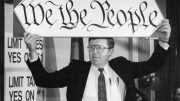A dangerous new class-action opening against franchise businesses.
The National Labor Relations Board has given unions and plaintiff attorneys a cache of weapons to target businesses. Now they’ve been handed a “two-barreled joint employer shotgun,” as plaintiff attorney Michael Rubin crowed about the certification of his class-action lawsuit against McDonald’s.
Federal Judge James Donato recently allowed four plaintiffs to represent 500 McDonald’s franchise employees in wage and overtime claims against the corporation. In 2014 the plaintiffs sued the franchise owner and McDonald’s for incorrectly calculating overtime—adding hours worked after midnight during late-night shifts to the prior day—and not reimbursing them for washing their uniforms.
The franchise owner settled with the workers for $700,000. But McDonald’s disputed its liability as a “joint employer,” and that’s an opening for the plaintiffs bar.
In August 2014, the California Supreme Court held in Patterson v. Domino’s Pizza LLC that franchisers were not “vicariously liable” for how their franchises treat workers if they don’t have a “comprehensive and immediate level
of ‘day-to-day’ authority over matters such as hiring, firing, direction, supervision and discipline of the employee.” The court also held that franchisers may protect their brands with “business plan” standards such as requiring workers to keep their uniforms neat and clean.
This legal interpretation dovetailed with the Third Circuit Court of Appeals’s landmark 1982 decision in NLRB v. Browning-Ferris Industries of Pennsylvania, which the NLRB subsequently adopted. Judge Donato last year threw out claims against McDonald’s under a direct control joint-employer standard.
However, the NLRB has since rewritten its joint-employer standard to include “indirect control” over workers such as the computer systems that McDonald’s provided to franchises to calculate overtime. The NLRB’s prosecution of McDonald’s as a joint employer under this new standard could set a legal precedent, and unions and the plaintiffs bar certainly hope so.
Judge Donato has given plaintiff attorneys more ammo by ruling that McDonald’s could be held liable if its franchise employees had a “reasonable belief” the franchise owners were McDonald’s “ostensible agents.” This obscure legal theory of “ostensible agency” has rarely been applied to franchise relationships. Our legal sources couldn’t find any cases involving employment-related issues. So the ruling could establish another precedent.
This is the double-barreled shotgun that Mr. Rubin celebrates, and other franchisers could be collateral damage. The class-action certification will encourage more lawsuits against corporations as “ostensible agents” and joint employers, which will jack up insurance premiums. The plaintiffs bar could soon be able to target multiple businesses with one lawsuit.
Source: www.wsj.com




